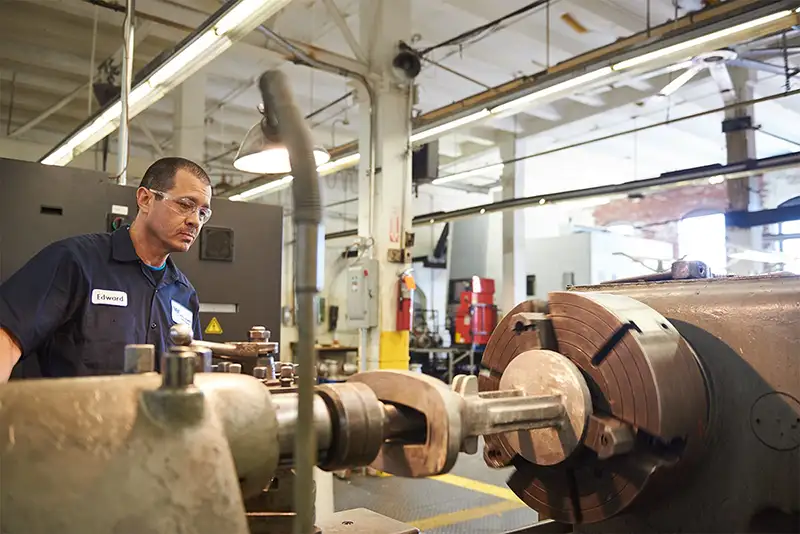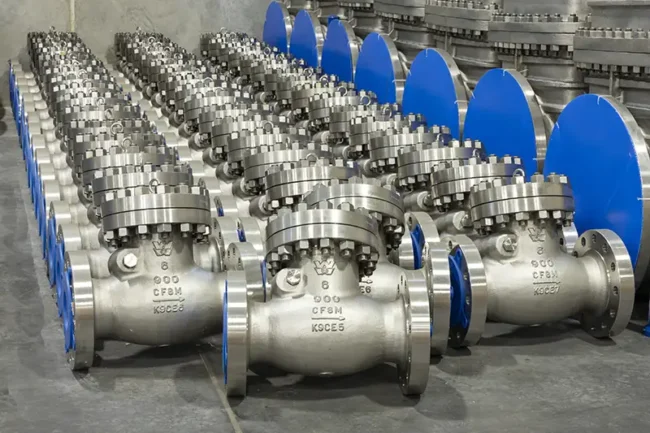Industrial Valve Services
 Extend the lifespan of your critical valve systems with our comprehensive industrial and commercial valve services. Our expert technicians at Williams Valve are equipped to handle a wide range of needs.
Extend the lifespan of your critical valve systems with our comprehensive industrial and commercial valve services. Our expert technicians at Williams Valve are equipped to handle a wide range of needs.
In all our work, we maintain strict compliance with relevant industry standards (ANSI, API, ISO) and safety regulations, so you can be confident in the quality of our products and services. Count on us as a trusted partner for all your industrial valve needs.
Custom Industrial Valve Design
If you need something beyond a standard industrial or commercial valve, our experienced engineering team can help develop a custom valve precisely designed to meet your needs. We take many factors into consideration during the design process in order to achieve a safe and reliable outcome for you.
One of the top priorities is the pressure rating. Your valve must withstand the maximum operating pressure of the system, as well as any potential pressure surges or hydrostatic test pressures. We account for the Pressure Class (e.g., 150#, 300#, 600# ANSI ratings) as well as the maximum allowable working pressure at specific temperatures. Understanding your required flow rate, flow coefficient, pressure drop limitations, and flow characteristics helps us select the appropriate valve type and size.
The operating temperature range for your specific process will significantly influence our material selection and design. High or low temperatures can affect material strength, sealing capabilities, and the performance of actuators and other components. For example, cryogenic or high-temperature service generally require specialized designs like extended bonnets. In addition, the type of fluid or gas flowing through the valve dictates the material of construction for the body, trim, and seals to ensure chemical compatibility and prevent corrosion. Tight shut-off (e.g., bubble-tight) may also be required, which dictates specific seat materials and designs.
How will the valve be operated? Manual, pneumatic, electric, or hydraulic actuation each has its own considerations regarding speed, torque, control requirements, and integration with automation systems. The overall physical dimensions, any weight limitations, and accessibility for maintenance are all part of creating a feasible design for your system. End connection types (flanged, threaded, welded) will also need to be compatible with your existing piping.
Engineering and Material Specs for Manufacturing
Engineering and material specs provide the foundational blueprints for our valve manufacturing. They ensure quality, performance, and safety in the final product
Engineering Valves to Steel Pipe Schedule
The steel pipe schedule is a standardized system for the nominal wall thickness of steel pipes. It categorizes pipes based on their ability to withstand pressure. The schedule ensures that the wall thickness is appropriate for the system’s pressure requirements.This is important to understand because it directly affects valve selection.
Nominal Pipe Size (NPS) is a North American standard that indicates the approximate size of the pipe bore. The NPS value dictates the wall thickness. A thicker wall (higher schedule) will result in a smaller internal diameter, while a thinner wall (lower schedule) will result in a larger internal diameter. For valves, the internal diameter is critical for understanding flow capacity, pressure drop, and overall compatibility.
Common Manufacturing Materials for New Valves
 Material selection is fundamental in valve engineering because the body and internal components must withstand the specific service conditions without failure or degradation. The chosen material must be compatible with your media to prevent corrosion or erosion and have adequate strength to handle pressure and temperature ratings.
Material selection is fundamental in valve engineering because the body and internal components must withstand the specific service conditions without failure or degradation. The chosen material must be compatible with your media to prevent corrosion or erosion and have adequate strength to handle pressure and temperature ratings.
Some of our most frequently used metals in valve manufacturing include:
- ASTM B61 Alloy 922
This cast metal, commonly known as Composition M, retains a larger percentage of its strength and ductility up to 550°F than most other cast copper bass alloys. - ASTM B62 Alloy 836
Commonly known as eight-five and three fives (85/5-5-5), this alloy is used for pressure-containing parts of our bronze valves at service temperatures up to 450°F. - ASTM A216 Grade WCB Carbon Steel
For non-corrosive applications including steam, water, oil vapor and gas, and general services at temperatures -20° to 1000°F.
Other materials we use in our manufacturing include adaptable composites such as:
- TFE Metal Reinforced Graphoil
Composite where a layer of TFE is combined with flexible graphite, and the entire structure is reinforced with a metal core or facing. This aims to leverage the chemical resistance of TFE, the sealing properties of graphite, and the strength of the metal. - Graphoil TFE
Flexible graphite is the primary component, combined with TFE particles or fibers. This enhances the graphite’s properties with the low friction and broad chemical compatibility of TFE.
One-Stop Shop for Your All Industrial Valve Needs
Our extensive in-stock inventory is ready for immediate shipment. We have you covered for all your industrial and commercial valves. At Williams Valve, we provide the solutions you need, precisely when you need them. Contact us today and get a quote for your valve service and modification.
